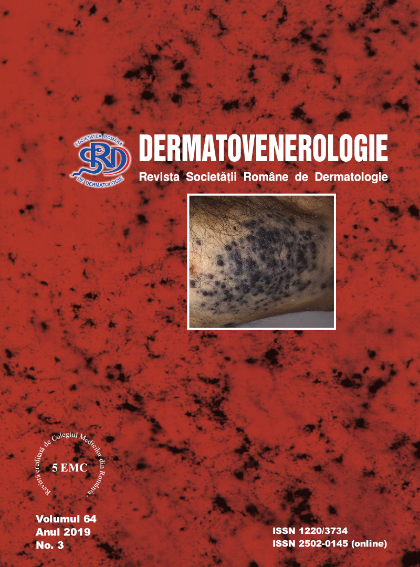Abstract
Introduction: Melkersson-Rosenthal syndrome
is a rare, idiopathic neuromucocutaneous disease. It is
characterized by recurrent or persistent orofacial swelling,
intermittent peripheral facial nerve paralysis and fissured
tongue. In cases of persistent, disfiguring macrocheilia
with functional impairment surgical treatment is often
required.
Clinical case: We report a 38-year-old male patient,
who presented for a non-painful, persistent swelling
of the lower lip. According to the patient, the current
disease started approximatively 20 years ago, with
intermittent edema of the lower lip, that progressively
became permanent. On physical examination, the patient
showed a disfiguring, slightly asymmetric enlargement
of the lower lip with labial mucosal eversion and fissured
tongue, without facial nerve palsy. Patient underwent
Conway’s reduction cheiloplasty. Histopathological
examination revealed an increased number of dilated blood
vessels, a chronic inflammatory infiltrate, a thickened
dermis with disorganized collagen bands and the presence
of stellate fibroblasts. Based on the history, clinical
features and histopathologic findings the diagnosis of
oligosymptomatic Melkerrson-Rosenthal syndrome was
made. Postoperatively, oral doxycycline 100 mg twice
daily was administered for 3 months. At follow-up the
patient showed no recurrence of the labial swelling.
Discussions: Reduction cheiloplasty is often
debated in the literature, stressing the importance of
deferring surgery until the disease has been stabilized
with conservative therapy, in order to avoid recurrence.
In our case, however, due to the disease inactivity, severe
aesthetic and functional impairment, surgical treatment
was essential.
Conclusions: The management of granulomatous
cheilitis is often challenging and there is no consensus
regarding the preferred therapy. Surgical management
through Conway’s reduction cheiloplasty followed by oral
administration of doxycycline might be a valid therapeutic
approach for cases with persistent, severe, disfiguring
macrocheilia.
Clinical cases
SURGICAL TREATMENT OF PERSISTENT MACROCHEILIA IN A PATIENT WITH OLIGOSYMPTOMATIC MELKERSSON-ROSENTHAL SYNDROME


